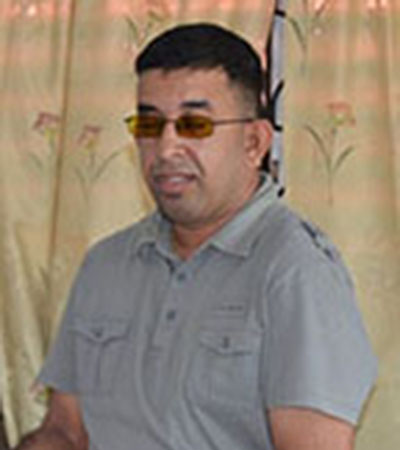Another call has been made for the legal framework to be put place to ensure persons with disabilities (PWDs) can independently exercise their right to vote if that is their choice.
Programme Coordinator of the Guyana Council of Organisations for Persons with Disabilities (GCOPD) Ganesh Singh yesterday said that while he knows this cannot be done for the March 2nd elections, his organisation will be lobbying the Guyana Elections Commission (GECOM) over the next five years to ensure that it is a reality for the 2025 polls.
“We are hoping after elections to do some work… lobbying for legislative changes to provide a legal framework so that systems for elections in Guyana can be more inclusive and accessible to persons with disabilities,” Singh said.
His call was met with support from the Chairperson of GECOM, retired Justice Claudette Singh, who said she will also be working to address the request.
“I will urge the commission, as soon as our reform commission is established, to address your concerns so the enabling legislation can be passed to give effect to your needs,” Justice Singh stated later.
The two were at the time speaking at the launch of a voter education workshop for PWDs at the National Library. The campaign is being spearheaded by the GCOPD in partnership with the International Republican Institute and it is aimed at sensitising PWDs on their rights as voters. They will also be educated on the voting process, while information will be provided to GECOM elections day staff on how to appropriately communicate and interact with voters with disabilities.
Justice Singh said it is important that voters understand their rights and duties under the constitution as well as the elections laws, and specifically the Representation of the People Act, so that they can fulfil their obligations in a responsible way.
Importantly, Justice Singh noted, the Act does not make provision to enable a person who is blind or physically incapacitated to vote independently. However, she said Section 13 (1) (c) of the Act allows the right to vote by proxy for persons who are unable by reasons of either blindness or any other physical disability.
But this does not guarantee that the proxy will vote in conformity with the instructions of the voter.
GECOM has heard the complaints, the Chairperson said, and she noted that there is need for legislative changes to be implemented.
According to Ganesh Singh, the GCOPD does not wish to have such campaigns at every elections where it has to lobby GECOM to provide stencils for the blind to vote. Instead, it wants such provisions to be legislated.
According to him, the education campaign started last December with a conference that saw the involvement of stakeholders from all the organisation across Guyana that support persons with disabilities and from that conference recommendations were made and forwarded to GECOM. Follow-up meetings were held and yesterday’s workshop is one of a series to be held across Guyana.
Over the next two weeks, workshops will be held in regions 2, 10, 3 and 4, while information will be forwarded to persons in Regions 5, 7 and 6 “so that persons with disabilities can be fully aware of the rights of voters….”
Audio clips and a brochure will be forwarded to GECOM to educate elections day staff on how to interact with PWDs on that day.
Singh said although all systems are not in place as yet it is hoped that PWDs will have a “decent experience when they go to cast their ballot.” He added that while they would have, ideally, wanted to conduct training with the staff, the current efforts will have to suffice as an urgent fix to the issue.
Also speaking at the launch was US Ambassador to Guyana Sarah Ann Lynch, who in her remarks said that the US Embassy is honoured to have the GCOPD as a key partner in pursuing the shared objective of supporting free and fair elections in Guyana.
The ambassador said the new initiative will provide voters with essential information about their rights and the basic procedures for voting. She noted that while GECOM has had an extensive public campaign, the information does not always reach PWDs, hence the initiative. The campaign will help voters with disabilities to overcome challenges many take for granted, including the right to access their polling stations and to independently exercise their vote. It was noted that PWDs may be deterred from voting because they do not know if they will be able to access their polling station and be able to vote independently. As a result, she said the US stands with the GCOPD as they work to ensure that there is equal opportunity for PWDs to vote.
She revealed that among the recommendations handed over to GECOM from the PWDs community was access for the blind and visually-impaired to vote privately and independently, special instructions for voters who are deaf, and ramps and slip resistance surfaces for the physically impaired.
Justice Singh, in further remarks, said that GECOM is mandated to conduct free, fair and credible elections and in this regard voters’ education is extremely important. “An elector has a voice, he or she speaks through the ballot…” she said adding that electors must be encouraged to exercise such rights.
Informed, responsible voters, Justice Singh said, help to safeguard the electoral integrity and do not make false statements that might disrupt or distract an electorate and do not intimidate other voters or try to tamper with the elections results.






